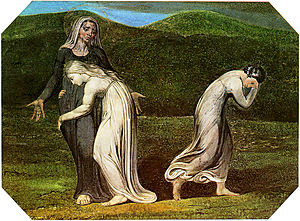 Image via Wikipedia
Image via WikipediaIt’s interesting for me to reflect that Ruth is memorialized not only by her courtship with Boaz but also by having moved from Moab to Israel. While it’s a story of faithfulness, diligence, humility, and obedience it is also an account of how a pagan, a Moabitess, whose people since the days of Baal Peor, were at enmity with Israel, married into a Hebrew family and fell in love with the God of Israel.
Nestled between the Book of Judges and the Book of Samuel, the Book of Ruth relates an event that occurred during the time of the Judges, when Israel flirted with foreign gods and drifted away from worshipping the God of Israel. So it is all the more astonishing that Ruth, instead of drawing her husband into pagan practices, was herself drawn to worship the god of Israel.
The first thing we learn about Ruth’s in-laws is that Elimelech, whose name means “My God is King”, sojourned in Moab with his family until the famine afflicting Bethlehem of Judea passed. Since Elimelech never intended to leave Israel permanently, he probably kept the love of Israel and reverence for God alive in his home. Perhaps he enjoyed retelling the stories of all that God did for Israel; of how God delivered Israel out of Egypt; of the battles that Joshua won; of the deliverance God gave Israel through various Judges. Perhaps the Sabbath observance touched Ruth’s heart as she participated in this family ritual over the years of marriage. Or, perhaps, as she heard her in-laws continue to pray and place their lives into the hands of the God they knew loved them, she understood that God lived.
What Scripture does state is that when the widow, Naomi, Ruth’s mother-in-law, decided to return to Bethlehem, she released her two daughter-in-laws to return to their own families. In Ruth 1: 16-17, we read:
“But Ruth replied, “Don’t urge me to leave you or to turn back from you. Where you go I will go, and where you stay I will stay. Your people will be my people and your God my God. Where you die, I will die, and there I will be buried. May the Lord deal with me ever so severely, if anything but death separates you and me.”
When Ruth arrived in Bethlehem, she had already embraced the God of Israel, and was prepared to worship Him and to grow in knowledge of Him. Ruth also no doubt understood that she was a foreigner, a widow, older than most marriageable women. Maybe she was resigned to quietly living with her mother-in-law, while doing her best to honorably provide for their needs.
I think the most interesting aspect of Ruth was that she came to Bethlehem in order to grow closer to God; to know Him more. And, God, by way of revealing Himself to her, showed her His love by orchestrating her marriage to one of Bethlehem’s most prominent men, Boaz. Through Ruth’s marriage to Boaz both Ruth and Naomi were blessed when Ruth bore a son. The story of Ruth effectively closes with the townswomen blessing Naomi and praising God for His love and faithfulness to her.
Ultimately, Ruth was King David’s Great-grandmother. Maybe because she knew firsthand the pervasive evil of pagan idolatry, she clung all the more tenaciously to the knowledge of the One True God, the King of the Universe. By virtue of the strength of her faith, I am certain that she powerfully testified to the reality of God and to the depth of His commitment to Israel before the people of Israel who were so tempted to follow the pagan gods she abandoned. I’m speculating, but I think that Ruth figured King David’s lineage because she lived her life proclaiming God’s Sovereignty and God’s love for Israel.

No comments:
Post a Comment